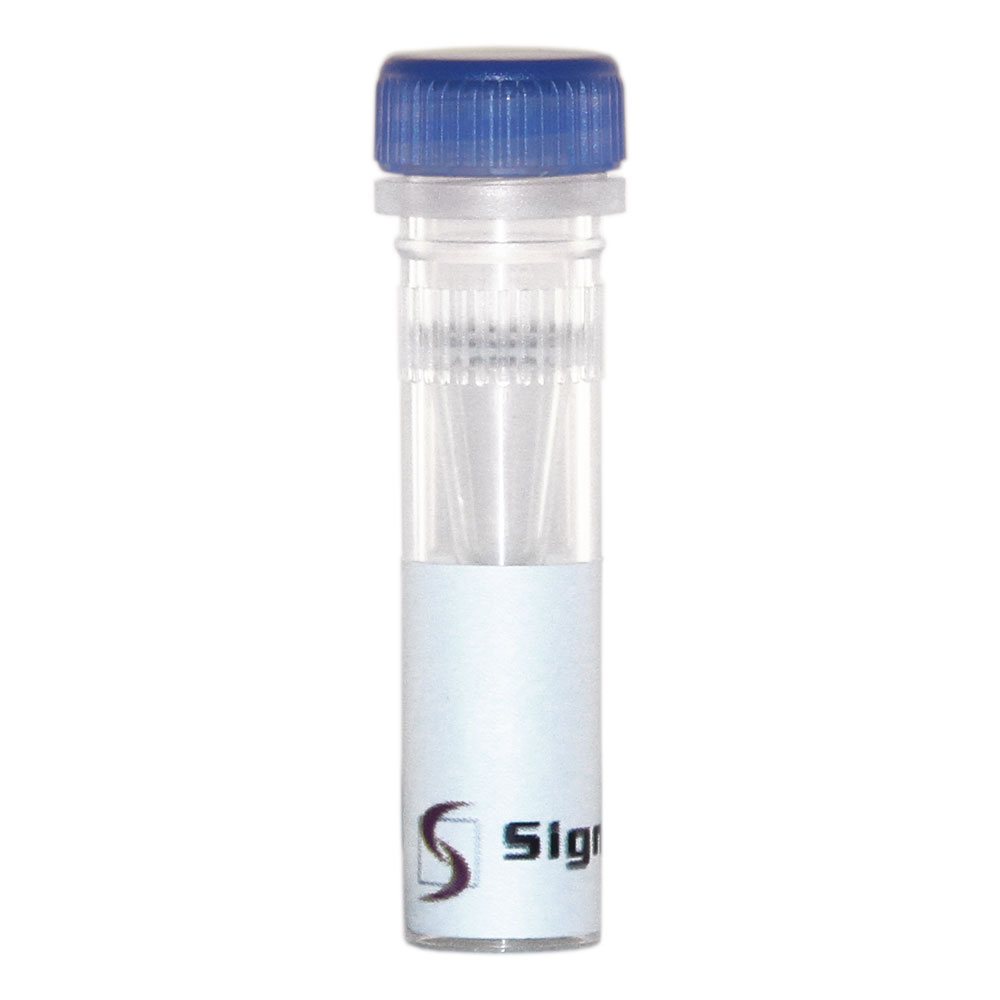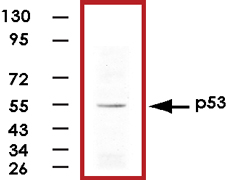
Anti-phospho-p53 (Ser392)
Rabbit Polyclonal Antibody
Catalog No. P05-363R
| Catalog No. | Pack Size | Price (USD) | |
|---|---|---|---|
| P05-363R-100 | 100 ul | $715 | |
| P05-363R-BULK | BULK | Contact Us |

Rabbit Polyclonal Antibody
Catalog No. P05-363R
| Catalog No. | Pack Size | Price (USD) | |
|---|---|---|---|
| P05-363R-100 | 100 ul | $715 | |
| P05-363R-BULK | BULK | Contact Us |
Overview:
p53 is a key regulator of cell growth and acts as a tumor suppressor gene. Wild-type p53 gene can suppress transformation of rat embryo fibroblasts in cell culture by other oncogenes such as the adenovirus E1A and Ras (1). DNA tumor viruses such as SV40 large T antigen and the adenovirus E1A plus E1B-55Kd proteins bind to p53 and inactivate its tumor suppressor activities leading to cellular transformation. Mutational inactivation of the p53 gene is detected in more than 50% of human cancers. Mutation of p53 renders cancer cells more resistant to current cancer therapies due to lack of p53-mediated apoptosis (2).
References:
1. Levine, A J. et al: Tumor suppressor genes: the p53 and retinoblastoma sensitivity genes and gene products. Biochim Biophys Acta. 1990 Jun 1;1032(1):119-36.
2. Sun, Y. p53 and its downstream proteins as molecular targets of cancer. Mol Carcinog. 2006 Jun;45(6):409-15.
Specificity:
Recognizes the p53 protein phosphorylated at serine 392
Cross Reactivity:
Human and Rat
Host:
Rabbit, IgG
Immunogen:
Synthetic phospho-peptide corresponding to amino acid residues surrounding Ser392 conjugated to KLH
Purification:
Affinity Chromatography
Stability:
Store at 4oC (add 0.1% NaN3) for several months, and at -20oC for longer periods. For optimal storage, aliquot target into smaller quantities after centrifugation and store at recommended temperature. For most favorable performance, avoid repeated handling and multiple freeze/thaw cycles.
Sample Data:
Western blot of rat brain nuclear fraction lysate showing specific immunolabeling of the ~53kDa p53 phosphorylated at Ser392 (Control). The phosphospecificity of this labeling is shown in the second lane (lambda-phosphatase: lambda-Ptase). The blot is identical to the control except that it was incubated in lambda-Ptase (1200 units for 30 min) before being exposed to the Anti-phospho-p53 (Ser392) antibody. The immunolabeling is completely eliminated by treatment with lambda-Ptase.

|
![]() A. Hilton Benjamin et al., ATR Plays a Direct Antiapoptotic Role at Mitochondria, which Is Regulated by Prolyl Isomerase Pin1 Molecular Cell October 2015 10.1016/j.molcel.2015.08.008
A. Hilton Benjamin et al., ATR Plays a Direct Antiapoptotic Role at Mitochondria, which Is Regulated by Prolyl Isomerase Pin1 Molecular Cell October 2015 10.1016/j.molcel.2015.08.008
![]() Ling Chau Jenny Fung et al., A crucial role for bone morphogenetic protein-Smad1 signalling in the DNA damage response Nature Communications May 2012 10.1038/ncomms1832
Ling Chau Jenny Fung et al., A crucial role for bone morphogenetic protein-Smad1 signalling in the DNA damage response Nature Communications May 2012 10.1038/ncomms1832
![]() Li Q et al., Genetic analysis of p53 nuclear importation Oncogene December 2007 10.1038/sj.onc.1210597
Li Q et al., Genetic analysis of p53 nuclear importation Oncogene December 2007 10.1038/sj.onc.1210597
![]() Graczyk Agnieszka et al., S100A6 Competes with the TAZ2 Domain of p300 for Binding to p53 and Attenuates p53 Acetylation Journal of Molecular Biology September 2013 10.1016/j.jmb.2013.06.007
Graczyk Agnieszka et al., S100A6 Competes with the TAZ2 Domain of p300 for Binding to p53 and Attenuates p53 Acetylation Journal of Molecular Biology September 2013 10.1016/j.jmb.2013.06.007
![]() Chen Dongshi et al., TAp73 promotes cell survival upon genotoxic stress by inhibiting p53 activity Oncotarget September 2014 10.18632/oncotarget.2440
Chen Dongshi et al., TAp73 promotes cell survival upon genotoxic stress by inhibiting p53 activity Oncotarget September 2014 10.18632/oncotarget.2440
![]() S Mondal et al., A bioluminescent assay for monitoring conjugation of ubiquitin and ubiquitin-like proteins. Analytical Biochemistry October 2016 10.1016/j.ab.2016.06.016
S Mondal et al., A bioluminescent assay for monitoring conjugation of ubiquitin and ubiquitin-like proteins. Analytical Biochemistry October 2016 10.1016/j.ab.2016.06.016
Apoptosis/Autophagy, Cancer, Cardiovascular Disease, Cell Cycle, Cellular Stress, Inflammation, JNK/SAPK Pathway, Metabolic Disorder, Neurobiology, p38 Pathway
STAY CONNECTED
Fax: 1-604-232-4601